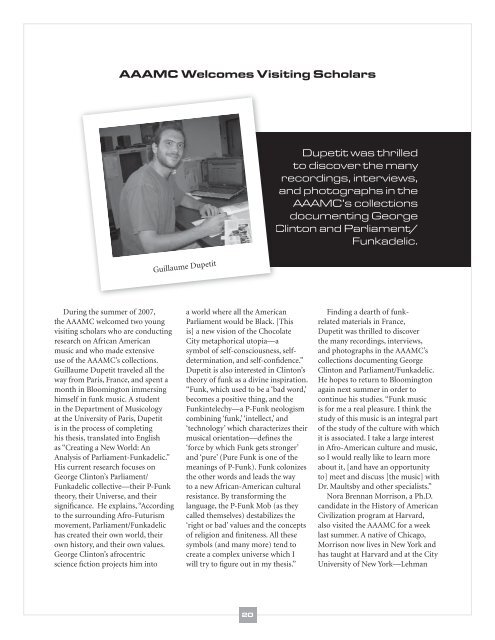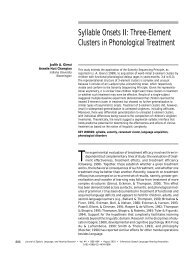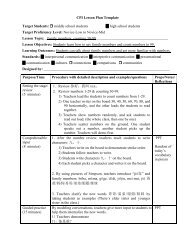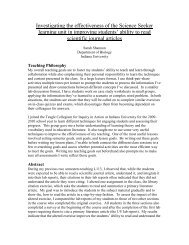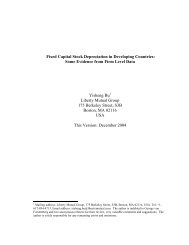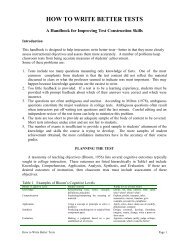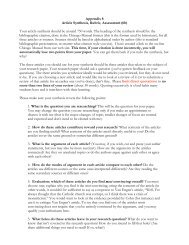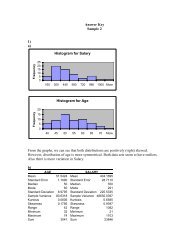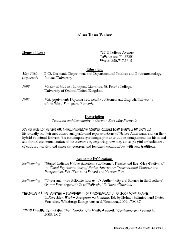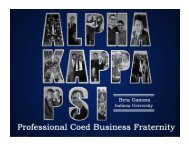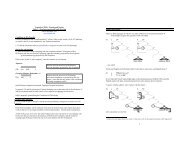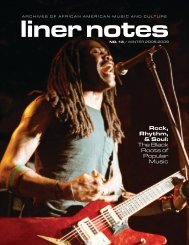Roots of Techno: Black DJs and the Detroit Scene - Indiana University
Roots of Techno: Black DJs and the Detroit Scene - Indiana University
Roots of Techno: Black DJs and the Detroit Scene - Indiana University
Create successful ePaper yourself
Turn your PDF publications into a flip-book with our unique Google optimized e-Paper software.
AAAMC Welcomes Visiting Scholars<br />
Dupetit was thrilled<br />
to discover <strong>the</strong> many<br />
recordings, interviews,<br />
<strong>and</strong> photographs in <strong>the</strong><br />
AAAMC’s collections<br />
documenting George<br />
Clinton <strong>and</strong> Parliament/<br />
Funkadelic.<br />
Guillaume Dupetit<br />
During <strong>the</strong> summer <strong>of</strong> 2007,<br />
<strong>the</strong> AAAMC welcomed two young<br />
visiting scholars who are conducting<br />
research on African American<br />
music <strong>and</strong> who made extensive<br />
use <strong>of</strong> <strong>the</strong> AAAMC’s collections.<br />
Guillaume Dupetit traveled all <strong>the</strong><br />
way from Paris, France, <strong>and</strong> spent a<br />
month in Bloomington immersing<br />
himself in funk music. A student<br />
in <strong>the</strong> Department <strong>of</strong> Musicology<br />
at <strong>the</strong> <strong>University</strong> <strong>of</strong> Paris, Dupetit<br />
is in <strong>the</strong> process <strong>of</strong> completing<br />
his <strong>the</strong>sis, translated into English<br />
as “Creating a New World: An<br />
Analysis <strong>of</strong> Parliament-Funkadelic.”<br />
His current research focuses on<br />
George Clinton’s Parliament/<br />
Funkadelic collective—<strong>the</strong>ir P-Funk<br />
<strong>the</strong>ory, <strong>the</strong>ir Universe, <strong>and</strong> <strong>the</strong>ir<br />
significance. He explains, “According<br />
to <strong>the</strong> surrounding Afro-Futurism<br />
movement, Parliament/Funkadelic<br />
has created <strong>the</strong>ir own world, <strong>the</strong>ir<br />
own history, <strong>and</strong> <strong>the</strong>ir own values.<br />
George Clinton’s afrocentric<br />
science fiction projects him into<br />
a world where all <strong>the</strong> American<br />
Parliament would be <strong>Black</strong>. [This<br />
is] a new vision <strong>of</strong> <strong>the</strong> Chocolate<br />
City metaphorical utopia—a<br />
symbol <strong>of</strong> self-consciousness, selfdetermination,<br />
<strong>and</strong> self-confidence.”<br />
Dupetit is also interested in Clinton’s<br />
<strong>the</strong>ory <strong>of</strong> funk as a divine inspiration.<br />
“Funk, which used to be a ‘bad word,’<br />
becomes a positive thing, <strong>and</strong> <strong>the</strong><br />
Funkintelechy—a P-Funk neologism<br />
combining ‘funk,’ ‘intellect,’ <strong>and</strong><br />
‘technology’ which characterizes <strong>the</strong>ir<br />
musical orientation—defines <strong>the</strong><br />
‘force by which Funk gets stronger’<br />
<strong>and</strong> ‘pure’ (Pure Funk is one <strong>of</strong> <strong>the</strong><br />
meanings <strong>of</strong> P-Funk). Funk colonizes<br />
<strong>the</strong> o<strong>the</strong>r words <strong>and</strong> leads <strong>the</strong> way<br />
to a new African-American cultural<br />
resistance. By transforming <strong>the</strong><br />
language, <strong>the</strong> P-Funk Mob (as <strong>the</strong>y<br />
called <strong>the</strong>mselves) destabilizes <strong>the</strong><br />
‘right or bad’ values <strong>and</strong> <strong>the</strong> concepts<br />
<strong>of</strong> religion <strong>and</strong> finiteness. All <strong>the</strong>se<br />
symbols (<strong>and</strong> many more) tend to<br />
create a complex universe which I<br />
will try to figure out in my <strong>the</strong>sis.”<br />
Finding a dearth <strong>of</strong> funkrelated<br />
materials in France,<br />
Dupetit was thrilled to discover<br />
<strong>the</strong> many recordings, interviews,<br />
<strong>and</strong> photographs in <strong>the</strong> AAAMC’s<br />
collections documenting George<br />
Clinton <strong>and</strong> Parliament/Funkadelic.<br />
He hopes to return to Bloomington<br />
again next summer in order to<br />
continue his studies. “Funk music<br />
is for me a real pleasure. I think <strong>the</strong><br />
study <strong>of</strong> this music is an integral part<br />
<strong>of</strong> <strong>the</strong> study <strong>of</strong> <strong>the</strong> culture with which<br />
it is associated. I take a large interest<br />
in Afro-American culture <strong>and</strong> music,<br />
so I would really like to learn more<br />
about it, [<strong>and</strong> have an opportunity<br />
to] meet <strong>and</strong> discuss [<strong>the</strong> music] with<br />
Dr. Maultsby <strong>and</strong> o<strong>the</strong>r specialists.”<br />
Nora Brennan Morrison, a Ph.D.<br />
c<strong>and</strong>idate in <strong>the</strong> History <strong>of</strong> American<br />
Civilization program at Harvard,<br />
also visited <strong>the</strong> AAAMC for a week<br />
last summer. A native <strong>of</strong> Chicago,<br />
Morrison now lives in New York <strong>and</strong><br />
has taught at Harvard <strong>and</strong> at <strong>the</strong> City<br />
<strong>University</strong> <strong>of</strong> New York—Lehman<br />
0


